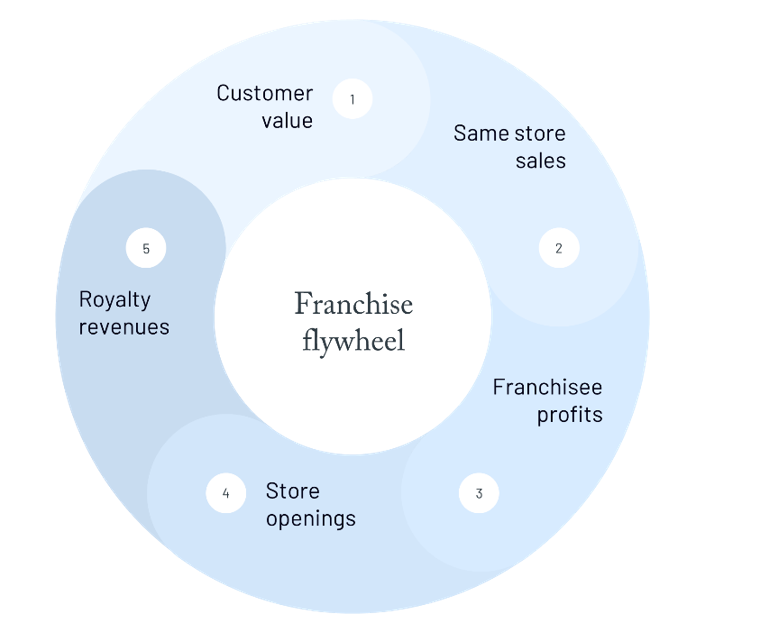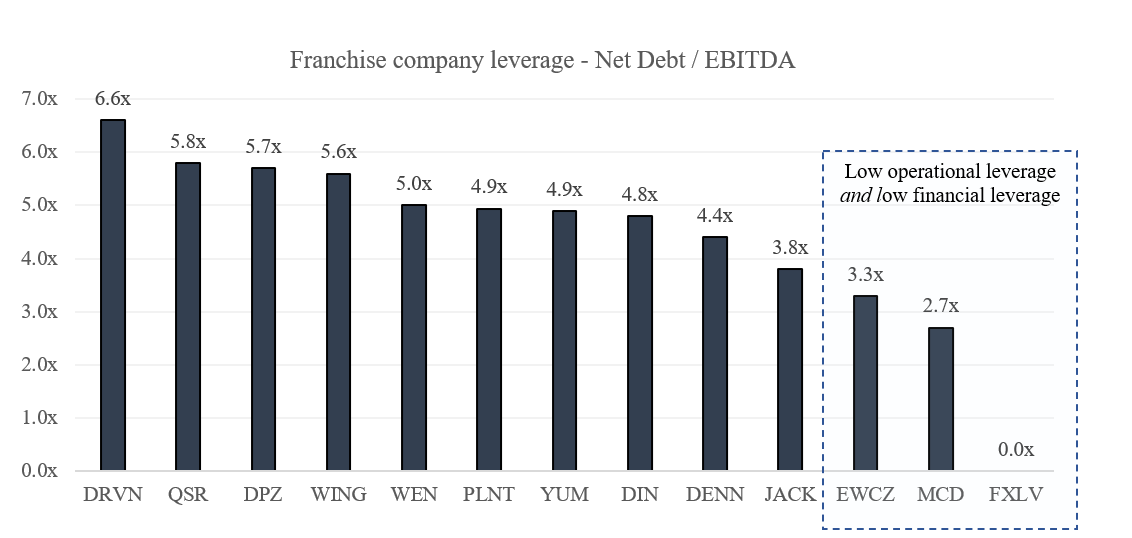Franchised growth insulated from rates
We share three high-conviction franchised business models to navigate current macro uncertainty amid rising rates: EWCW, FXLV and MCD
About us: GORA is an Australian-led equities fund, based in NYC that invests solely in the US Consumer sector.
These are unique times. Macro uncertainly is high and becoming more elevated each week. Concurrently, inflation is compelling central banks to tighten monetary policy. Both conditions haven’t existed side by side in more than a generation.
To safely navigate this environment investors should look for businesses offering high visibility of future cash flows to insulate from the macro, with unlevered balance sheets to avoid interest rate risk. Said another way, investors should prize equities offering low operating leverage with low financial leverage.
Akin to the macro combination set described above, these two investment features rarely exist in tandem. In this note, we share three companies offering the best of both worlds. All are franchised business models. These models are among our favorites in any environment, but particularly in today’s world of elevated risk. Two are new to public markets and off the beaten path of traditional franchised models (EWCZ and FXLV), the third is very familiar (MCD). They offer stable growth, low debt and come at modest valuations.
Quality franchised business models – the flywheel effect
Franchised business models can be excellent investments for their stable and growing cash flows. Franchisors own the brands and collect royalties on sales made by franchises. Franchisees run the stores, retain sales ex royalties, and bear business operating costs. The franchisor (what equity investors own) enjoy predictable revenue streams with strong profit margins.
A franchise flywheel can be created with customer value at its core that drives compounding EBITDA growth greater than in company-operated models. The flywheel starts with customer value because customer value ensures franchisees see customers walking into their stores (same store sales). Healthy same store sales make their enterprises profitable. Profitable franchisees will choose to reinvest into the brand by opening new stores because their returns on investment are attractive. More stores means more sales, means more royalties coming back to the franchisor – the franchisor is profitable. The last stop in our flywheel is the franchisor re-investing into the brand through marketing, product, technology to further enhance customer value.

More growth, less vol
These dual advantages of higher growth with lower volatility are illustrated in the chart below. It displays earnings growth and earnings volatility for the ten largest listed franchised and company-operated equities in the restaurant and leisure sectors. On average, EBITDA growth is sustainably higher for franchised business models.
More relevant however is the far lower volatility in earnings of franchised business models relative to their company-operated peers. The explanation here is simple – franchisors don’t bear operating costs and therefore have far lower operating leverage to changes in sales. This feature is extremely valuable. Low earnings volatility means very high stability and visibility into future earnings.
To highlight this comparative advantage in franchised business models, only one of the largest ten listed restaurant and leisure companies showed historic earnings volatility equal to the average franchised model earnings volatility – Starbucks (SBUX).

Quality, franchised business models without the debt
Low volatility of earnings supports higher debt. Like infrastructure assets, franchised business models typically lean on their low earnings volatility to carry high debt. Leverage for most is comfortable in the 4-6x Net Debt/EBITDA range.
This presents a unique problem in a rising interest rate environment. Firstly, highly levered companies are exposed to rising interest expense on their variable-rate debt, as well as upon refinancing fixed-rate debt. More pressingly, highly levered companies see outsized earnings multiple contraction in periods of tightening. Investors should be weary of defaulting to an assumption of safety in franchised business models during a tightening cycle.
This caution is the reason we’ve carefully selected three names offering all the benefits of low operating leverage described above with the surprising benefit of low financial leverage.
The chart below illustrates this benefit. EWCZ and MCD are at the low end of franchisor leverage relative to peers and for each, more than 90% of their debt is fixed with 5yr+ durations. FXLV carries no debt.

Set for a record year in 2022
Everything we’ve described above reflects the macro risk attributes of the three companies featured in this note. Let’s dig into why we like them at an idiosyncratic level:
· European Wax Center (EWCZ) – Is the largest provider of waxing services. Their stores have high brand awareness and can be run with very low cost of operations for franchisees, making their units among the most highly profitable of any franchised business. Significant white space for future store growth underwrites long-term royalty revenue growth for the franchisor. The company announced in January its pipeline of new stores in development had reached a company record of 330 locations, which it expects will support 2022 earnings growth above long-term target growth. The company is also actively pursuing capital allocation opportunities in light of its under-levered, and rapidly de-levering balance sheet.
· F45 Training (FXLV) – Australian fitness studio franchisor with franchisee commitments in place to more than triple the number of studios currently open. FXLV is having outsized success in the US and Canada. The company shared in February that it had secured supply for the equipment to open approximately 1,200 new studios in 2022 – far exceeding market expectations. Similar to EWCZ above, we believe this datapoint is a valuable de-risking event for the year ahead.
· McDonald’s (MCD) – Needs no introduction but is the largest QSR chain in the world. MCD is also enjoying the highest same-store sales growth in the industry thanks to its continuous reinvestments in improving customer value. MCD oddly stands to benefit from inflation. Its franchisees are easily the most profitable in the industry and can therefore absorb inflationary shocks far better than the competition. Franchisees at competitor brands who have been forced to raise menu prices to preserve their profitability are pushing more traffic gains into the golden arches.
Never miss an insight
Enjoy this wire? Hit the ‘like’ button to let us know. Stay up to date with my content by hitting the ‘follow’ button below and you’ll be notified every time I post a wire.
Not already a Livewire member? Sign up today to get free access to investment ideas and strategies from Australia’s leading investors.

